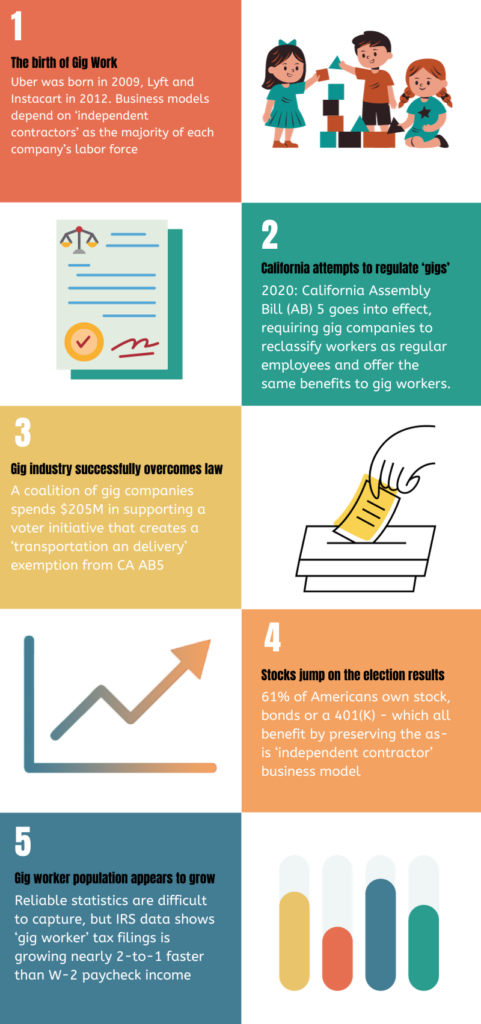This time we didn’t rent a car. The plan was to take the shuttle, reduce our carbon footprint and save a few bucks on vacation.
But it also means no Target run for forgotten items. Instacart to the rescue. I’ve never used Instacart before. You put items into the cart, select delivery, pay a $9.99 fee, and it’s still cheaper than renting a car.
I Google searched how you tip an Instacart driver. Ours was diligently texting with my bride for substitutions and delivery arrival updates.
I headed down to meet Anne with my questions about this whole gig delivery thing and got a few hurried answers. She’s a Bay Area native who moved to Hawaii after college. She’s a school teacher and on fall break, which is a thing here, and relies on gig work to help pay the bills. With a wave and a thanks, she disappeared into the night.
I look down at the newly delivered treasures, and Taylor Swift’s voice fades in with, “It’s me, hi, I’m the problem, it’s me.”
People used to have careers, then just jobs, and we’ve come down to gigs. Heck, 59% of Californians voted in 2020 to empower the gig economy by empowering independent contractors.
Or, so went the most expensive proposition battle in California to date. A coalition including Lyft, Uber, DoorDash, Instacart and Postmates spent more than $205 million in the fight for their corporate life. Had the proposition failed, people like Anne would be entitled to compensation for their gas and expenses, unemployment protection and all the other basic things someone expects from an employer. Proposition 22’s success meant the gig drivers, delivery workers and the like are empowered to settle for the hourly wage and hope tips cover the costs to make their efforts worthwhile.
I’m hardly anti-business. I own a small business, strive to take care of my two guys, pay the bills and have a little left for a vacay that ideally lacks a rental car. That’s the American way, or at least it once was the ideal.
The trend is our willingness to trade convenience for someone else’s inconvenience. By extension, the gig workers accept the inconvenience for the chance to cover their bills and maybe get a little ahead. The ease of pressing a button on the Uber app means a licensed, insured and background-checked taxi driver isn’t getting the fare.
If you’re an Uber shareholder, you do a little dance each time the button is pressed. A 2021 Gallup poll suggests 61% of Americans own some form of an interest in the stock market: stocks, bonds, EFTs or have a pension or 401(K) that depends on the stock market. We collectively want and need corporate America to be profitable, but profits need to consider the true costs of success.
I wonder if your Uber stock would have truly been hurt if their drivers had to be treated and compensated as employees. I don’t think so.A good service remains in demand. The difference would have been the odds of having a driver with the flu may be much lower if drivers had the option of paid sick time off. The bills don’t stop just because you have a fever, but a mutually beneficial employee-employer relationship would provide better care.
I have yet to take ECON 10, but I get some of the basics. Depressing wages and denying benefits is profitable to the company, but not to the economy. A worker with spending money will actually SPEND money. That spending happens at the market down the street, which employs your neighbors, who in turn have money to spend at restaurants, buy clothes and fuel a Target run.
I doubt Anne is an Instacart shareholder. I’m certain there’s no paid sick time for her. I’m also certain if Target opted to hire their in-store shoppers and delivery drivers, the cost would not be dramatically worse than today. I’m similarly confident doing so, on a larger scale across our country, would help address some of the financial inequities we continue to face.
So yes, Taylor, I suppose I was the problem last night. Much as Scrooge waking on Christmas morning having been visited by the three ghosts of Christmas past, present and future, I find there’s a lesson to take away from the bigger picture of our enabling of big business to take advantage of folks who just want to pay the bills without due regard for those upon whom their business is so inherently dependent.
Paul George is the copy editor at the Express. Follow him on X @paulGeorgePIO



